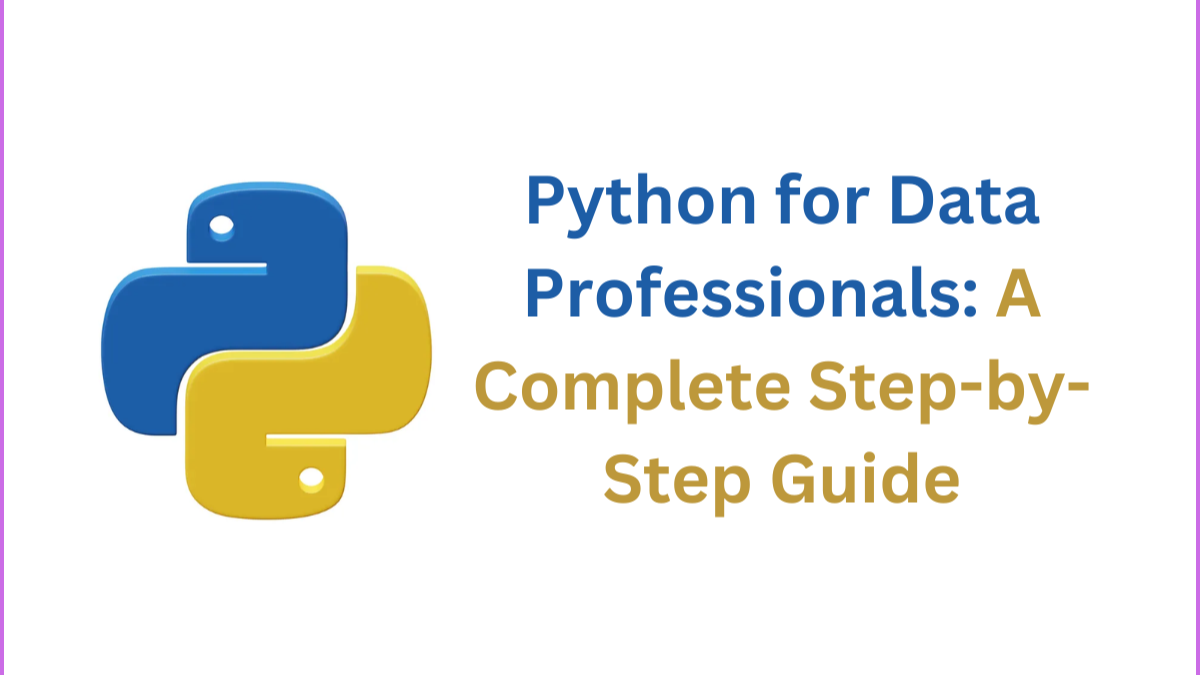
Python for Data Professionals: A Complete Step-by-Step Guide
Esther Anagu, MBA
Data Analyst & Data Scientist @ Wema Bank PLC | Empowering Businesses with Data Insights | DM for collaboration ??
Over two years ago, when I started my career as a data professional, my very first project was a machine-learning model built primarily using Python. Thankfully, I had already learned Python, which turned out to be crucial for that project’s success.
At the time, I was an intern, and while I had some input on joining the data science team, my boss also saw it as the right fit for me. This experience taught me something important: while tools like Excel and SQL are essential, mastering other tools like Python can open even more doors, especially when you're just starting.
Many recommend mastering one tool at a time, and while that’s valuable advice, I believe in learning multiple key tools early on. You never know when you'll need them, and the knowledge can often be transferable. For instance, if you know Python, learning other tools like R becomes much easier.
That’s why this month, I’m focusing on Python and sharing resources that will help you learn it effectively. Python is one of the most versatile languages in data science, and mastering it can take you from basic data analysis to building advanced machine learning models.
In this article, I’ll guide you through three key stages for mastering Python, recommend platforms to study, and suggest possible projects to showcase your skills.
Why Python is Essential for Data Professionals
Python is a powerful, beginner-friendly programming language widely used for data analysis, visualization, and machine learning. It has beginner-friendly syntax and powerful libraries for data manipulation, visualization, and machine learning. It is a must-have for every data professional. It’s used for everything from cleaning and exploring data to building complex predictive models.
Python is also widely used in industries like finance, healthcare, and tech, where data plays a critical role in decision-making. By mastering Python, you’re opening up a world of possibilities in your career and makes your workflow more efficient especially when you're rerunning an analysis or sharing insights with stakeholders.
Here’s a roadmap to help you master Python at every stage of your journey.
1. Basic Python Concepts for Beginners
If you’re new to Python, it is important to master the foundational concepts. Python's simplicity makes it an ideal language for beginners, but it's still powerful enough to handle advanced tasks.
Key Basic Concepts to Master:
2. Intermediate Python Concepts
Once you've mastered the basics, it's time to level up. Intermediate Python skills are essential for more complex data science tasks.
Key Intermediate Concepts to Master:
领英推荐
3. Advanced Python Concepts for Data Professionals
As you grow in your career, you may start working on more advanced data science projects that require deeper Python knowledge. Although these advanced topics might seem challenging, they will significantly enhance your skills.
Key Advanced Concepts to Master:
Platforms for Learning and Practicing Python:
There are countless platforms to learn Python, but here are three of the best places to build your Python skills and practice effectively:
Projects to Build Your Python Skills
Once you’ve learned the basics of Python, the next step is applying it through projects. Here are some project ideas for beginners:
Projects like these help solidify your Python knowledge and also give you practical experience that you can showcase in your portfolio. Plus, they allow you to explore various aspects of data science, from cleaning and analyzing data to building predictive models.
Best Book for Beginners:
For those just starting, “Python Crash Course” by Eric Matthes is an excellent book that breaks down these foundational concepts into manageable lessons. By the end of this book, you’ll have built simple projects, like creating a small game, that applies all the concepts you’ve learned.
As you explore the resources and projects shared in this guide, remember that mastery takes time and practice. Start small, build projects, and consistently push yourself to tackle more complex problems. Soon, you’ll find yourself taking on projects you once thought impossible!
If these resources resonate with you, don’t hesitate to share this guide with your network. The more you practice, the faster you’ll grow—and who knows, your next big project might be just around the corner!
Feel free to check out my previous articles for more tips and resources on mastering data analysis:
Chartered Accountant | Data Analytics Enthusiast |Transforming Data into Actionable Insights l Virtual Assistant with experience in book-keeping and data entry.
2 个月Thanks so much, this really very enlightening!
Predictive Modeling Analyst |Data Analysis, and Visualization | Skilled in Python, SQL, and Power BI
5 个月Very informative
Senior Research Consultant @ Rural Doctors || Head of Schools of Health, Home Economics, Tourism & Hotel Mgt @ HIBES || IRB Member @ CRERSH SWR MoH || Doctorate ?? in Business Administration (Project Mgt) @ SSBM Geneva.
6 个月Gone through your profile, its amazing Esther Anagu, MBA. Keep it up! ??
A Web Developer at MB-TECH GLOBAL COMPANY
6 个月Thank you for your tips.
RN || BNSc || Data Analyst || Graphic Designer
6 个月It’s indeed a top notch guide… Very insightful…